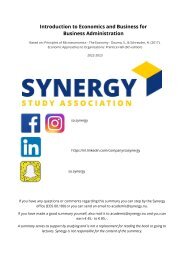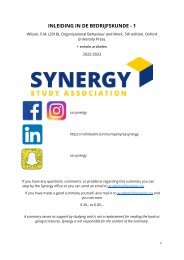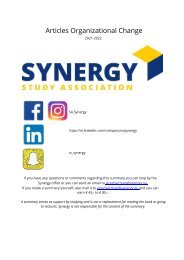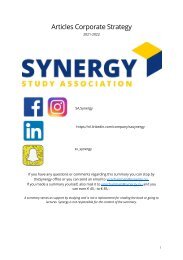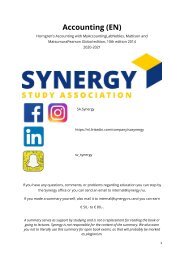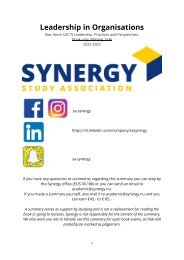Create successful ePaper yourself
Turn your PDF publications into a flip-book with our unique Google optimized e-Paper software.
assets for the future tax consequences of events that have been recognized in the financial<br />
statements or tax returns.<br />
Key deferred income tax terms → bladzijde 981.<br />
Chapter 21 – <strong>Accounting</strong> for Leases<br />
A lease is a contractual agreement between a lessor <strong>and</strong> a lessee. This arrangement gives the<br />
lessee the right to use specific property, owned by the lessor, for an agreed period of time. In<br />
return for the use of the property, the lessee makes rental payments over the lease term to the<br />
lessor. Who are the lessors that own this property? They generally fall into one of three<br />
categories:<br />
1. Banks → Banks are the largest players in the leasing business. They have low-cost funds, which<br />
give them advantage of being able to purchase assets at less cost than their competitors.<br />
2. Captive leasing companies → Captive leasing companies are subsidiaries whose primary<br />
business is to perform leasing operations for the parent company.<br />
3. Independents<br />
The growth in leasing indicates that it often has some genuine advantages over owning property,<br />
such as:<br />
1. 100% financing at fixed rates → Lease payments often remain fixed, which protects the lessee<br />
against inflation <strong>and</strong> increases in the cost of money.<br />
2. Protection against obsolescence<br />
3. Flexibility → Lease agreements may contain less restrictive provisions than other debt<br />
agreements. Innovative lessors can tailor a lease agreement to the lessee’s special needs.<br />
4. Less costly financing → Some companies find leasing cheaper than other forms of financing.<br />
5. Tax advantages<br />
6. Off-balance-sheet financing<br />
The various views on capitalization of leases are as follows:<br />
1. Do not capitalize any leased assets<br />
2. Capitalize leases that are similar to instalment purchases → This view holds that companies<br />
should report transactions in accordance with their economic substance.<br />
3. Capitalize all long-term leases<br />
4. Capitalize non-cancellable leases where the penalty for non-performance is substantial.<br />
Non-cancellable means that Air France can cancel the lease contract only upon the outcome of<br />
some remote contingency, or that the cancellation provisions <strong>and</strong> penalties of the contract are so<br />
costly to Air France that cancellation probably will not occur.<br />
A lease is classified as a finance lease if it transfers substantially all the risks <strong>and</strong> rewards<br />
incidental to ownership. In order to record a lease as a finance lease, the lease must be noncancellable.<br />
Air France classifies <strong>and</strong> accounts for leases that do not meet any of the four criteria<br />
as operating lease (Illustration 21-3).<br />
If the lease transfers ownership of the asset to the lessee, it is a finance lease.<br />
A bargain-purchase option allows the lessee to purchase the leased property for a price that is<br />
significantly lower than the property’s expected fair value at the date the option becomes<br />
exercisable.<br />
If the lease period is for a major part of the asset’s economic life, the lessor transfers most of the<br />
risks <strong>and</strong> rewards of ownership to the lessee. The lease term is generally considered to be the<br />
fixed, non-cancellable term of the lease. However, a bargain-renewal option, if provided in the<br />
lease agreement, can extend this period. A bargain-renewal option allows the lessee to renew the<br />
lease for a rental that is lower than the expected fair rental at the date the option becomes<br />
40









